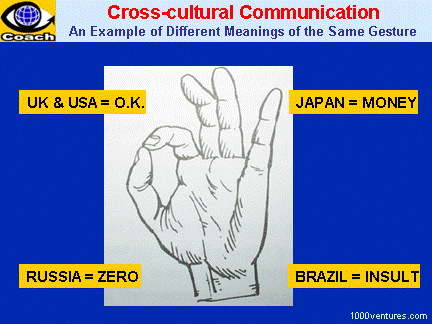
Random picture that I found this interesting, didn't know that this gesture meant money in Japan and and insult in Brazil! Emphasizes the importance of being sensitive and aware of our actions when interacting with people of different cultures.
------------------------------------------------------------------------------------------------------------

Picture from: http://www.1000ventures.com/business_guide/crosscuttings/cross-cultural_differences.html
Text from: http://www.languagetrainers.co.uk/blog/2007/09/24/top-10-hand-gestures/
------------------------------------------------------------------------------------------------------------
Mainly used by scuba divers to mean “OK” (to prevent ambiguity with the thumbs-up sign, which means “ascend”), this hand gesture is generally called ‘A-OK’, and in America and the UK is often used to tell somebody that they’ve made a great meal, as talking with your mouth would just be impolite. Essentially the meaning comes out as “great”, or “absolutely fine”.

Not so, however, in a few countries in Europe, where the numerical interpretation gives the signal an insulting overtone – essentially you’re telling them that you think they’re a ‘zero’.
Far worse, however, is the meaning in Brazil, Germany and a few Mediterranean countries: the circular shape of the gesture gives it the meaning of “anus”, and is therefore used to call somebody an “asshole”, or, by extension, a homosexual.
Picture from: http://www.1000ventures.com/business_guide/crosscuttings/cross-cultural_differences.html
Text from: http://www.languagetrainers.co.uk/blog/2007/09/24/top-10-hand-gestures/
